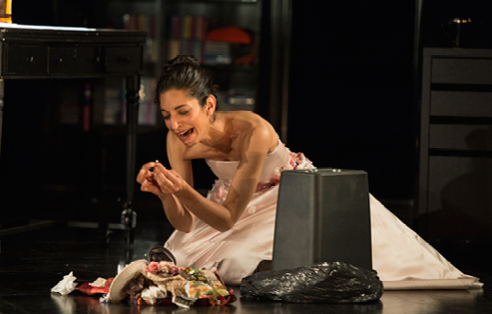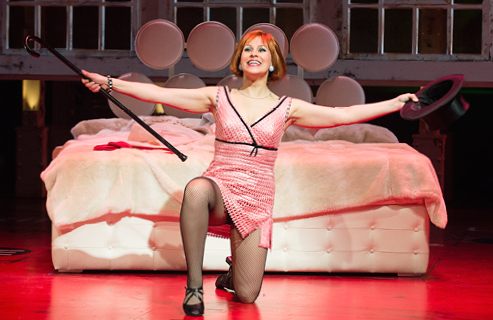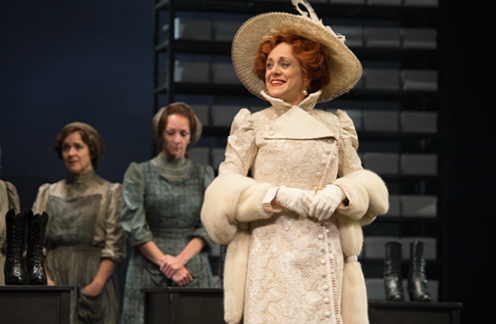The mission of the Shaw Festival, presented annually in the pretty little town of Niagara-on-the-Lake, Ontario, is not only to present the works of George Bernard Shaw and his contemporaries, but also that of modern playwrights who, like the great master, explore social issues in a complex manner. On a recent visit to the fest, I took in seven plays by Shaw and others, many examining women challenging the restrictive roles forced on them by a male-dominated society both in Shaw’s time and today.

Credit: David Cooper
The most striking staging was Peter Hinton’s modern-dress Pygmalion. Known mainly as the source for My Fair Lady, this comedy of social manners is too often thought of as a cosy romance between the pushy phonetics professor Henry Higgins and the gruff but ambitious Cockney flower girl Eliza Doolittle whom he teaches proper English. But love is the least of Shaw’s concerns as he takes apart the rigid British class system and the intolerable position women held in it. By putting the action in 2014-15 (much like the National Theatre’s recent updating of Shaw’s Man and Superman), Hinton shows the issues raised are still relevant. Women are no longer trapped in marriages as a means of advancement or escape, but class distinctions are largely as iron-clad and impenetrable as ever. In between acts, videos on language and upward mobility document the new paradigms modern-day Elizas face. There are some gimmicky choices. Higgins’s proper mother has been transformed into a trendy fashion designer (complete with a retinue of models and security staff) and Eliza’s streetwise dad is made over into a reality-TV star. But the connection between Patrick McManus’ bulldozer of a Higgins and Harveen Shandhu’s scrappy Eliza is palpable and overcomes any such distractions. Eo Sharp’s sets and Christine Poddubiuk’s costumes create the perfect 21st century setting for this updated classic.

Credit: David Cooper
Sweet Charity may not seem to be an ideal companion to Shaw’s brainy word fest, but the 1966 Broadway musical is also about a woman attempting to free herself from a degrading dead-end situation. Based on Fellini’s classic film Nights of Cabiria, Neil Simon’s book takes an unflinching look at a hopelessly lovestruck taxi dancer seeking a prince charming to rescue her from her sleazy dime-a-dance profession. In Fellini’s original, the heroine is a prostitute and here she isn’t quite, but she is forced to allow customers to grope her on the dance floor. Morris Panych’s direction and Parker Esse’s choreography are not as sharp and polished as your average Broadway show, but with the aid of Ken MacDonald’s distressed subway-themed set, Charlotte Dean’s kicky costumes, and Cameron Davis’ period projections, they do summon up the right gritty atmosphere for Charity’s tale of woe. Panych and Esse blend just the right amount of razzmatazz with the material’s neorealist roots for a show that is both heartbreaking and exhilarating. Several of the Cy Coleman-Dorothy Fields musical numbers display the influence of Bob Fosse, the creator and stager of the first production, with Esse adding touches of his own. Julie Martell makes for a lovably tough Charity, slowly revealing the soft center beneath her hard shell.

Credit: David Cooper
The inspiration for Michel Marc Bouchard’s play The Divine: A Play for Sarah Bernhardt also involves a woman defying male authority, but attempts to cover too many other topics to be totally effective. Bouchard’s new commissioned work for the Festival is based on Bernhardt’s 1905 visit to Quebec City. The city’s powerful archbishop forbade her from performing her repertory which the local church considered sinful. Rather than focusing on Bernhardt and her conflict between the restrictive religion leaders, Bouchard gives the spotlight to a melodramatic plot involving the two seminarians delegated to deliver the archbishop’s letter of condemnation. One is a stagestruck aspiring playwright while the other is a victim of abuse by an older clergyman. In addition, there’s the latter student’s mother and brother who work in grueling conditions in a shoe factory. Between child labor, artistic expression, Canadian provincialism, and a dozen other themes, there’s just too much going on. Whenever Fiona Reid’s flamboyant Bernhardt is on stage, there is an electric connection between actress and script, but she is consigned off-stage for too much of this confusing play.
At the other end of the attention-span spectrum, J.M. Barrie’s 1910 one-act The Twelve-Pound Look runs a mere 35 tightly-focused minutes and effectively delineates the conflict between self-determined women and inflexible males. When the briskly efficient female typist hired by a pompous newly knighted businessman turned out to be the fellow’s ex-wife, a brief, scintillating debate on marriage, materialism, and the battle of the sexes ensues with Patrick Galligan and Moya O’Connell as the main talkers battling brilliantly. Lezlie Wade’s gem-like staging in the intimate Court House Theatre is a perfect cameo.
I’ll cover the three remaining Shaw fest productions in my next review.
Pygmalion: June 27—Oct. 24. Festival Theatre, 10 Queen’s Parade, Niagara-on-the-Lake, Ontario. Running time: two hours and 30 mins. including intermission.
Sweet Charity: May 16—Oct. 31. Festival Theatre, 10 Queen’s Parade, Niagara-on-the-Lake, Ontario. Running time: two hours and 40 mins. including intermission.
The Divine: A Play for Sarah Bernhardt: July 24—Oct. 11. Royal George Theatre, 85 Queen St., Niagara-on-the-Lake, Ontario. Running time: two hours and 45 mins. including intermission.
The Twelve-Pound Look: June 27—Sept. 12. Court House Theatre, 26 Queen St., Niagara-on-the-Lake, Ontario. Running time: 35 minutes with no intermission.
All plays: repertory schedule; $25—$116 (Canadian); 800-511-SHAW or www.shawfest.com.
This review appeared previous on ArtsinNY.com and Theaterlife.com.
